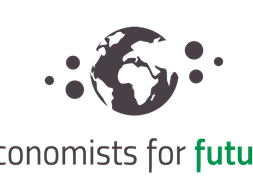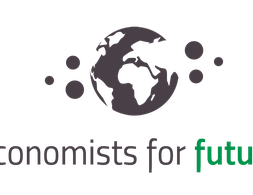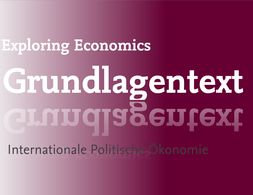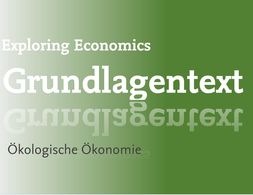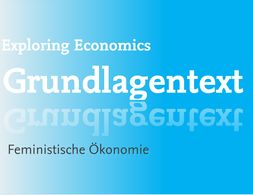212 Ergebnisse
Die Eleganz der modernen Klimaökonomik scheint für viele attraktiv. Wie sie nichtsdestotrotz die Realität verklärt, wichtige Machtfragen ignoriert und so unzulänglich für effektive Klimapolitik ist, zeigt dieser Beitrag von Philipp Censkowsky und Jorim Gerrard.
Weite Teile der vorherrschenden Ökonomik haben Bewegungen wie „Fridays for Futures“ oder „Extinction Rebellion“ kaum relevantes Wissen anzubieten. Dies liegt vor allem an einem ideologisch verengten Blick auf das, was als ökonomisch bezeichnet wird, sowie den daraus resultierenden Maßnahmen. Märkte gelten in der vorherrschenden VWL als Synonym für Ökonomie.
Modern Monetary Theory (MMT) is a school of monetary and macroeconomic thought that focuses on the analysis of the monetary and credit system, and in particular on the question of credit creation by the state.
Steve Keen analyses how mainstream economics fails when confronted with the covid-19-pandemic. Mainstream economics has propagated the dismantling of the state and the globalization of production - both of which make the crisis now so devastating. More fundamentally, mainstream economics deals with market systems, when what is needed to limit the virus’s spread is a command system.
Exploring Economics, an open-source e-learning platform, giving you the opportunity to discover & study a variety of economic theories, topics, and methods.
Firms are the primary places where economic activity takes place in modern capitalist economies: they are where most stuff is produced; where many of us spend 40 hours a week; and where big decisions are made about how to allocate resources. Establishing how they work is hugely important because it helps us to understand patterns of production and consumption, including how firms will react to changes in economic conditions and policy. And a well-established literature – led by post-Keynesians and institutionalists – holds that the best way to determine how firms work is to…wait for it...ask firms how they work. This a clearly sensible proposition that is contested in economics for some reason, but we’ll ignore the controversy here and just explore the theory that springs from this approach.
How countries achieve long-term GDP growth is up there with the most important topics in economics. As Nobel Laureate Robert Lucas put it “the consequences for human welfare involved in questions like these are simply staggering: once one starts to think about them, it is hard to think about anything else.” Ricardo Hausmann et al take a refreshing approach to this question in their Atlas of Economic Complexity. They argue a country’s growth depends on the complexity of its economy: it must have a diverse economy which produces a wide variety of products, including ones that cannot be produced much elsewhere. The Atlas goes into detail on exactly what complexity means, how it fits the data, and what this implies for development. Below I will offer a summary of their arguments, including some cool data visualisations.
Economic sociology is an entire subfield and one could write an series on it, so I’m going to stick to probably the most prominent economic sociologist and the founder of ‘new economic sociology’, Mark Granovetter.
An essay of the writing workshop on Nigeria’s Readiness for and the Effect of the Fourth Industrial Revolution
In diesem Text aus der Reihe "Exploring Economics - Foundations" werden die Grundlagen der Internationalen Politischen Ökonomie als interdisziplinäre wissenschaftliche Strömung dargestellt.
From the two premises that (1) economies are complex systems and (2) the accumulation of knowledge about reality is desirable, I derive the conclusion that pluralism with regard to economic research programs is a more viable position to hold than monism. To substantiate this claim an epistemological framework of how scholars study their objects of inquiry and relate their models to reality is discussed. Furthermore, it is argued that given the current institutions of our scientific system, economics self-organizes towards a state of scientific unity. Since such a state is epistemologically inferior to a state of plurality, critical intervention is desirable.
This paper starts with an evaluation of three common arguments against pluralism in economics: (1) the claim that economics is already pluralist, (2) the argument that if there was the need for greater plurality, it would emerge on its own, and (3) the assertion that pluralism means ‘anything goes’ and is thus unscientific. Pluralist responses to all three arguments are summarized. The third argument is identified to relate to a greater challenge for pluralism: an epistemological trade-off between diversity and consensus that suggests moving from a discussion about ‘pros’ and ‘cons’ towards a discussion about the adequate degree of plurality. We instantiate the trade-off by showing how it originates from two main challenges: the need to derive adequate quality criteria for a pluralist economics, and the necessity to propose strategies that ensure the communication across different research programs. The paper concludes with some strategies to meet these challenges.
This module examines current socio-political issues through the lens of pluralism, that is pluralism of theory, pluralism of method and interdisciplinary pluralism
Exploring Economics, an open-access e-learning platform, giving you the opportunity to discover & study a variety of economic theories, topics, and methods.
Stratification economics is defined as a systemic and empirically grounded approach to addressing intergroup inequality. Stratification economics integrates economics, sociology and social psychology to distinctively analyze inequality across groups that are socially differentiated, be it by race, ethnicity, gender, caste, sexuality, religion or any other social differentiation.
The outbreak of COVID-19 has substantially accelerated the digitalization of the economy. Yet, this unprecedented growth of digital technology brought novel challenges to the labour market. Rise in income inequalities and precarious working conditions or polarization of jobs. In this essay, we try to assess what tools to use to counter these trends.
Participants should be able to distinguish the strictly non-cooperative (methodological individualist) foundations of traditional neoclassical economics as being couched in self-interested individuals, as well as having basic knowledge of an alternative set of theories based on the primacy cooperation and social norms and extending the breadth of economic analysis beyond exchange.
After completing the module, participants should be able to have general overview on the theory of commons. They can differentiate between neoclassical, new institutional and social/critical commons theory and can use these theories to assess real life common-pool resource management and commoning pratices.
Das Paradigma der ökologischen Ökonomie (Ecological Economics) stellt einen multidisziplinärern Ansatz dar, um ein ganzheitliches Bild der wachsenden ökologischen Probleme und ihrer Verflechtungen mit der Ökonomie zu erhalten. Sie beschäftigt sich mit Ressourcenknappheit, Umweltverschmutzung, Klimawandel, Nahrungsmittelknappheit oder sozialer Ungleichheit. Hierbei werden wissenschaftliche Disziplinen wie Ökologie, Ökonomie, Physik und zunehmend auch andere Sozial- und Geisteswissenschaften (z.B. Soziologie oder Philosophie) herangezogen, mit dem Ziel, im ökonomischen Denken auch ökologische, ethische, politische, institutionelle und soziale Faktoren zu berücksichtigen. In diesem Zusammenhang werden nichtzuletzt deshalb auch wesentliche Grundannahmen der orthodoxen Ökonomie sehr kritisch betrachtet (Constanza 1989, Ayres 2008, Spash 2010).
Bei der feministischen Ökonomie geht es darum, den unbezahlten Teil der Ökonomie sichtbar zu machen und die Geschlechterblindheit von ökonomischen Prozessen aufzudecken. Entstanden ist diese Theorierichtung in den 1960er Jahren, wobei die Wurzeln bis ins 19 Jahrhundert zurück reichen. Zu Beginn setzten sich die Feministen und Feministinnen vor allem für das Erreichen des Frauenwahlrechtes, für den Zugang zur Bildung und der Abschaffung der Vernunftehe ein. Die Gleichberechtigung von Mann und Frau war in der zweiten Welle des Feminismus zu finden. Bis heute gibt es zwischen Männern und Frauen Unterschiede, welche durch den Feminismus versucht werden aufzudecken und zu beseitigen. Zum Beispiel die Care-Arbeit, den Gender-Wage-Gap, keine Berücksichtigung in ökonomischen Modellen, etc.
The effects of the 2020 pandemic on the Latin-American region: a thorough before-after analysis.
In the pluralist showcase series by Rethinking Economics, Cahal Moran explores non-mainstream ideas in economics and how they are useful for explaining, understanding and predicting things in economics.
Shadow banking became one of the main features of modern market based financial capitalism and financial globalisation. Daniel Gabor locates this development in a Super-Cycle framework and sketches out opportunities to launch a new cycle that is green and just through financial regulation and publicly organised sustainable finance.
In this lecture, Branko Milanovic gives an overview of the concept of inequality as conceptualized within the classical school of thought.
Marxian Political Economy focuses on the exploitation of labour by capital. The economy is not conceived as consisting of neutral transactions for exchange and cooperation, but instead as having developed historically out of asymmetric distributions of power, ideology and social conflicts.
Feminist economics focuses on the interdependencies of gender relations and the economy. Care work and the partly non-market mediated reproduction sphere are particularly emphasised by feminist economics.
Der Fokus der Institutionenökonomik liegt auf der Rolle von sozialen Institutionen, wie Verträgen, Gesetzen oder auch Verhaltensweisen, in der Produktion, der Verteilung und dem Konsum sowie auf den aus ihnen resultierenden sozialen Beziehungen.
This lecture of the anthropologist David Graeber gives a brief introduction to the thoughts of his 2011 published book Debt: The First 5000 Years.
This article considers the strengths of agent-based modelling and the ways that it can be used to help central banks understand the economy. These models provide a complement to more traditional economic modelling which has been criticised in the wake of the Great Recession.
Recording of the Workshop “The collateral supply effect on central banking”, 04.02.2021, part of the "Next Generation Central Banking - Climate Change, Inequality, Financial Instability" conference by the Heinrich-Böll-Stiftung
This panel was part of the conference "Next Generation Gentral Banking - Climate Change, Inequality, Financial Instability" 03. - 05.02.2021.
Immer wieder sind in den letzten Jahren die Folgen einseitiger Lobby- und Marktmacht deutlich geworden – und wie schwierig es ist, sie zu begrenzen.
Wir nutzen Cookies. Klicke auf "Akzeptieren" um uns dabei zu helfen, Exploring Economics immer besser zu machen!

